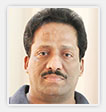
ANTO AKKARA
With masters in English literature, post graduate diploma in journalism and LL.B from Delhi University, Anto Akkara has been a journalist with international media for a quarter century. The journalist author who firmly believes that 'the pen is mightier than the sword' has reported extensively from hotspots in South Asia on human rights concerns, religious issues and social problems. In the process, he was won a dozen national and international media awards.
Anto received the Titus Brandsma Award for Journalism 2013 for his 'stellar work' on Kandhamal at the triennial WorldCongress of Christian Media in Panama city in October 2013. The award has been instituted in memory of Dutchjournalist Titus Brandsma who died in the Dachau concentration camp in 1942 for criticising Hitler.
When the national media forgot the simmering anti-Christian violence in Kandhamal jungles of Orissa from August 2008, it was Anto who stirred the national conscience with his investigative book 'Kandhamal - a blot on Indian Secularism' after repeated arduous trips to the Kandhamal jungles.
Since veteran journalist Kuldip Nayyar described the book as 'one of the must-read books' at its launch in New Delhi in April 2009, it has been hailed by cross sections. During the Bangalore launch, Justice M F Saldana said that given the objectivity of the book, it should be treated as an 'official report' of the Kandhamal violence and the government should act on it. K G Kannabiran, president of People's Union for Civil Liberties, hailed the book as 'a charge-sheet on Kandhamal' during the launch in Hyderabad. Renowned litterateur Sukumar Azhikode recommended the book to be made a 'text book' at its release at the Kerala Sahitya Academy.
Given the impact the investigative book made, the author had a personal audience with Home Minister P Chidambaram. Minister Chidambaram not only visited Kandhamal soon after receiving the book and he even told Indian Parliament that what happened in Kandhamal was 'a blot on the face of Orissa' – quoting the title of the book.
After laying bare before the nation the 'true story' of Kandhamal as 'The Hindu' remarked, Anto's second book on Kandhamal titled 'Shining Faith in Kandhamal' was released during the Catholic Mission Congress in Mumbai in October 2009.
Cardinal Varkey Vithayathil, Major Archbishop and president of Catholic Bishops Conference of India (CBCI) in his 'Foreword' to the book described it as 'A Book of Revelation'. "Shining Faith in Kandhamal reveals a true journalist who cannot remain a mute spectator in the face of inhuman atrocities. Love and responsibility for one's fellowmen finds expression in concern for the truth," pointed out Cardinal Vithayathil.
' Who killed Swami Laxmanananda?'
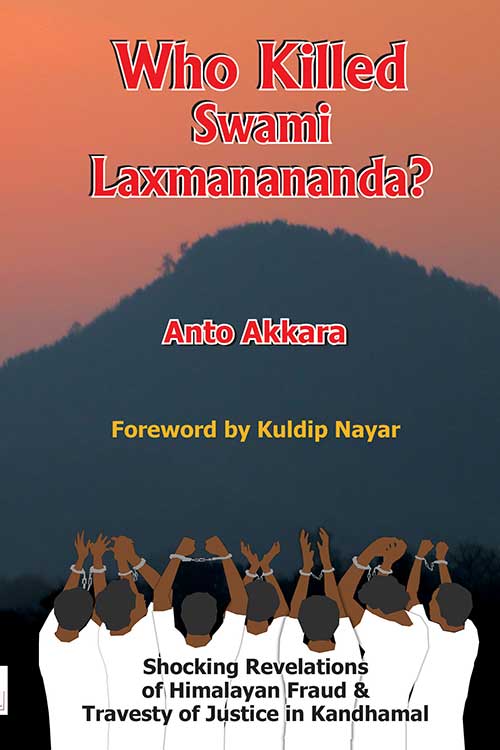
"The actual intention of the Europe, US, the Pope and Sonia Gandhi was to convert the entire region into the independent Christian land.”
Thus spake Swami Laxmanananda Saraswati in an interview featured in a documentary titled ‘The Agony of Kandhamal’.
However, he added, “God has sent me from Himalaya and it was stalled. That is why their campaign was to drive away swamiji and create a Christian land. As long as I am alive I shall not let you do that."
This boastful claim seemed to have been capitalized upon by vested interests.
The swami along with four others were mysteriously murdered on the night of Janmashtami in August 2008.
Since the swami had named even the Pope and Sonia Gandhi as people who considered him a threat to the Christianization of Kandhamal, it was easy to spread the rumour that Christians had killed him.
Given the hostility between Christians and the swami who used to carry out regular reconversion ('ghar wapsi') ceremonies during his rath yatras across Kandhamal, the Christian baiters knew they had a golden opportunity to demonise the community.
The fact that he was assassinated on Janmashtami night leads to the conclusion that the forces behind the swami's murder had envisaged the subsequent collateral damage. Nearly 100 Christians killed, 300 churches and 6,000 houses looted and plundered in unabated violence. That would explain the rationale behind the zigzag funeral procession crisscrossing Kandhamal for two days.
The orchestrated propaganda the 'India Foundation' carried out to foist conspiracies about Kandhamal across the world abusing the name of the nation itself leads to the logical question: if the Christians had conspired to kill the swami why should the top Sangh Parivar leadership risk their reputation to enact a fraud of Himalayan proportion?
The 'India Foundation' and the 'The Agony of Kandhamal' documentary it brought out have blown the lid off the Kandhamal fraud.
The travesty of justice - illustrated in-depth in Part II of this work - the black out and stoic silence of even the National Human Rights Commission on Kandhamal - all point the needle of suspicion in one direction only.
Yet, seven innocent Christians continue to languish in jail, convicted to life imprisonment for a crime they never committed.
' Kandhamal craves for Justice'
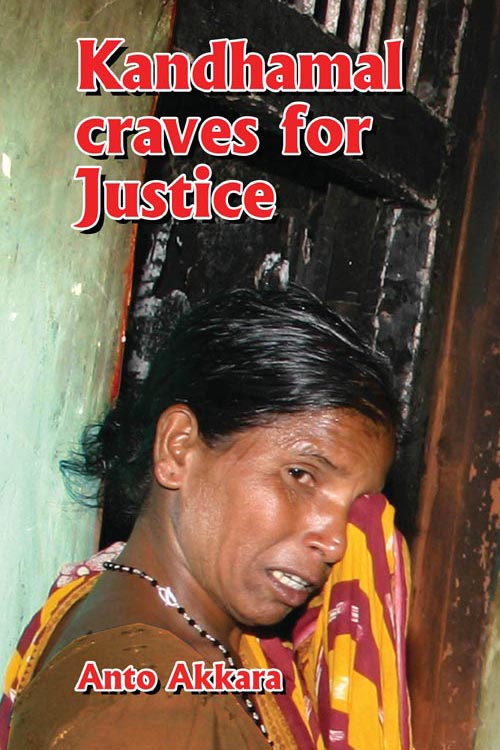
Released in New Delhi on August 23, 2013 – 5th anniversary of Kandhamal conflagration, the investigative book exposes the travesty of justice in Kandhamal– scrutinising the failure of the constitutional watchdogs like judiciary and the National Human Rights Commission (NHRC).
When the lofty constitutional guarantees were reduced to ashes along with churches and Christian houses, the mandarins of Orissa remained mute spectators to the bravado of saffron henchmen. The zealots threatened Christians to embrace Hinduism to live in Kandhamal. The defiant ones were put to the sword, chopped into pieces, burnt alive or crushed with boulders. Kandhamal has laid bare before the nation the ugly face of Hindu nationalism.
Amid pervasive stories of hatred, brutality, indifference, double-speak and deceit, the journalist author also brings to light how the silent majority has started speaking out ….offering a beacon of hope as reparation for the communal frenzy that has left a scar on the secular face of Mother India.
Packed with real-life stories, telling photos and incisive research inputs, the book by award-winning journalist raises uncomfortable questions on the justice delivery system and calls for attention into the travesty of justice in Kandhamal:
* How did the mighty arms of the Secular Democratic Republic of India
respond to the challenge?
* Did the judicial system falter in delivering justice?
* Why did the NHRC remain silent on the blatant human right
abuses in Kandhamal?
* Was there a bigger conspiracy behind the murder in the jungle?
'Kandhamal - a blot on Indian Secularism'
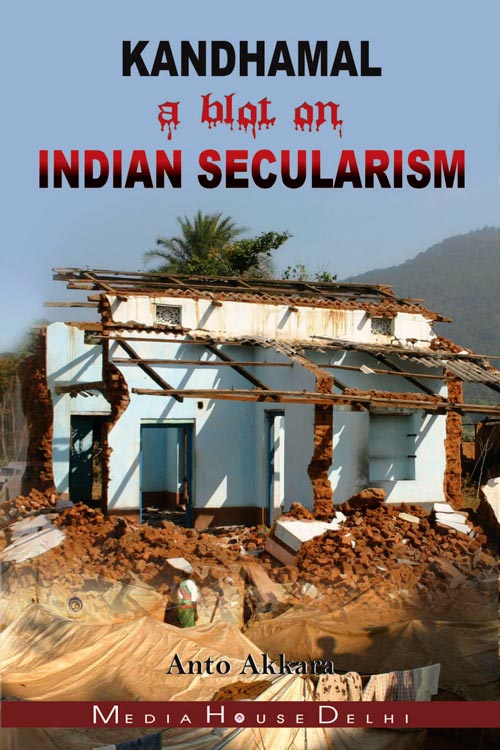
When the national media forgot the simmering anti-Christian violence in Kandhamal, journalist Anto Akkara stirred the national conscience with his investigative book 'Kandhamal - a blot on Indian Secularism' after repeated arduous trips to the remote jungle district.
Since veteran journalist Kuldip Nayar described the book as ‘one of the must-read books’ at its launch in New Delhi in April 2009, it has been hailed by cross sections. During the Bangalore launch, Justice M F Saldana said that given the objectivity of the book, it should be treated as an ‘official report’ of the Kandhamal violence and the government should act on it. K G Kannabiran, president of People’s Union for Civil Liberties, hailed the book as ‘a charge-sheet on Kandhamal’ during the launch in Hyderabad. Renowned litterateur Sukumar Azhikode recommended the book to be made a ‘text book’ at its release at the Kerala Sahitya Academy.
Given the impact the investigative book made, the author had a personal audience with P Chidambaram, then Home Minister of India. Chidambaram not only visited Kandhamal soon after receiving the book and he even told Indian Parliament that what happened in Kandhamal was ‘a blot on the face of Orissa’ – quoting the title of the book.
'Early Christians of 21 Century'
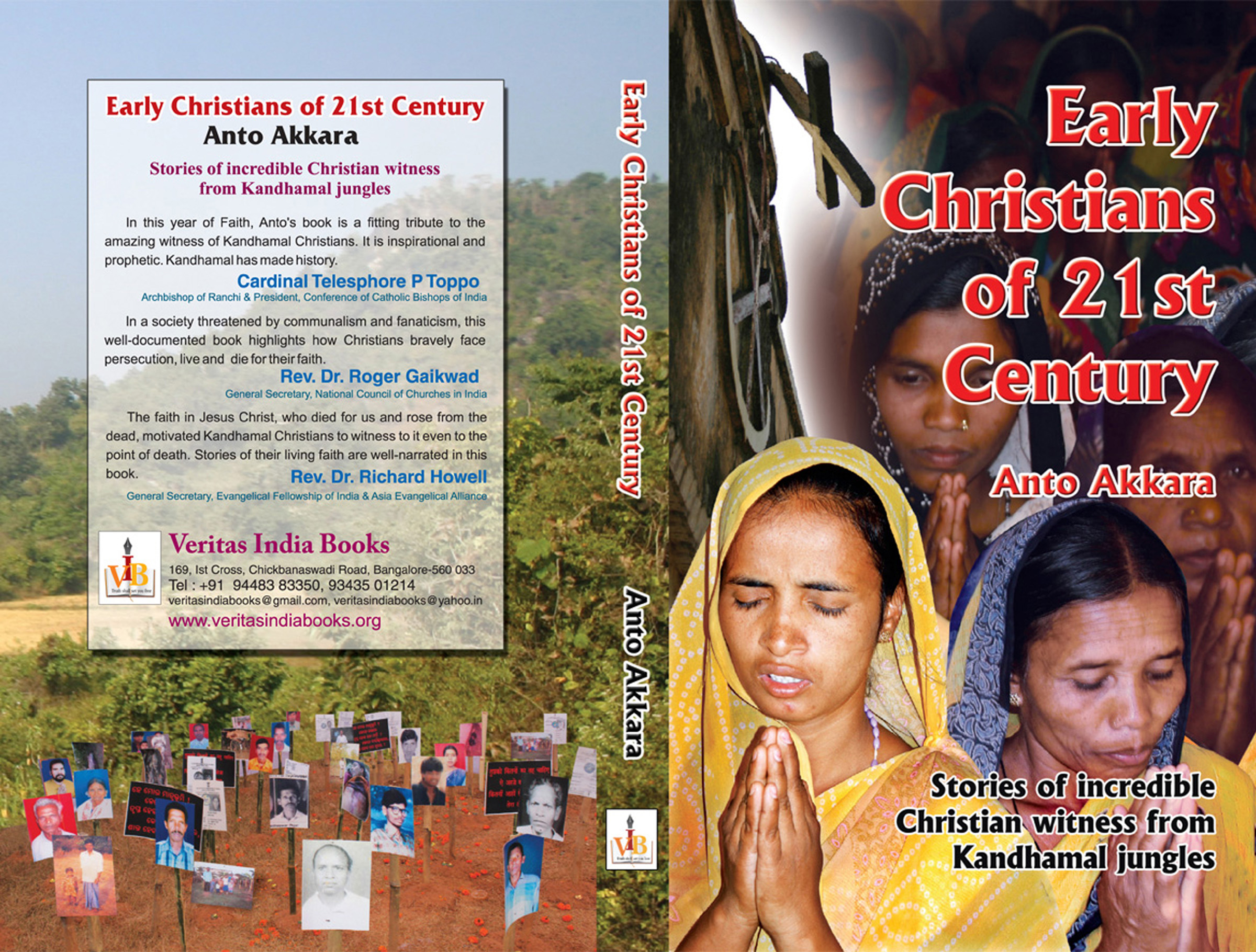
Released by Cardinal Fernando Filoni, prefect of the Congregation for Evangelisation of People's in February 2013 at Vailankanni, the book tells the incredible Christian witness amid brutal persecution. It highlights how the orchestrated violence in Kandhamal from late August 2008 was the saddest event in the history of Christianity in India.
With saffron foot-soldiers insisting on thousands of Christians to forsake faith to set foot in their native villages, refugee Christians turned their 'losses into gains'. They chose to languish in dingy slums than to turn their back to Christ and gave sterling testimony as true followers of Christ who gladly carried the cross without running away from it. History repeats itself.
Like the 'Early Christians', the poor but valiant Christians of Kandhamal sacrificed everything for their faith amid brutal persecution and carved out the most glorious moment since Apostle St. Thomas sowed the seeds of Christianity in India. Astounded by the amazing witness, even the assailants are now flocking to churches to profess the faith they tried to banish from Kandhamal.
The rock-like faith of even illiterate Christians inspired the journalist to venture into the Kandhamal jungles 18 times to document the incredible testimony of the zealous Christians surviving on empty stomachs amid burnt churches and plundered houses gathering moss. For holding on to their faith amid diabolic cruelty, rampant impunity and state apathy, the author aptly calls Kandhamal Christians 'Early Christians of 21st Century'.
While Cardinal Telesphore Toppo, former CBCI president, has described the book as 'inspirational and prophetic in the Year of Faith', Rev Roger Gaikwad, general secretary of the NCCI (National Council of Churches in India) calls it "a well documented book that highlights how Christians bravely face persecution, live and die for their faith."

